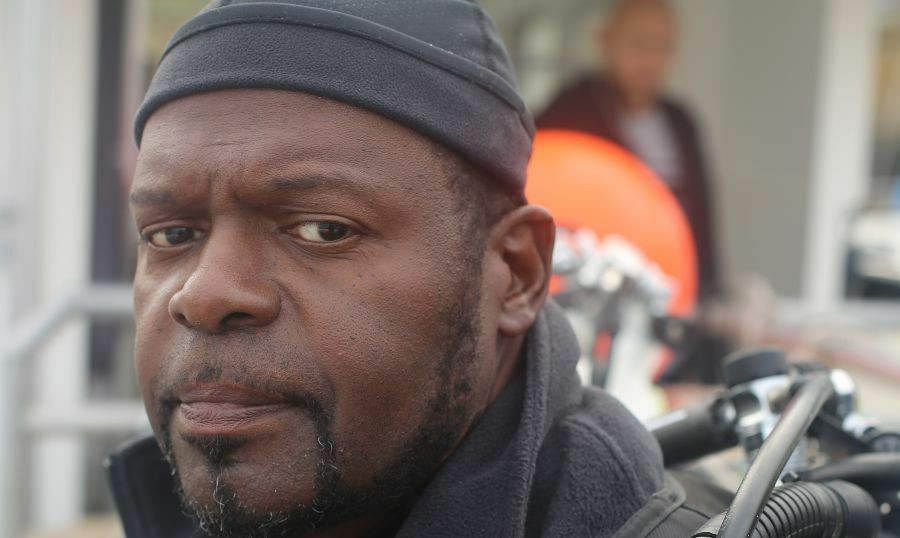Kramer Wimberley’s career path has thoroughly prepared him for his job in CBC’s upcoming Enslaved. The six-part documentary series, executive produced by Samuel Jackson and LaTanya Richardson Jackson, focuses a lens on the transatlantic slave trade with an investigative team of Black divers from underwater archeology and conservationist organization Diving With a Purpose (DWP). Prior to his life as a Master Scuba Diver Trainer, Wimberley was an arson investigator for The City of Newark, New Jersey, and a municipal prosecutor for a brief period of time. The investigative skills acquired from those past careers lend themselves well to the task of documenting and preserving the story of sunken slave ships and their precious African cargo, because what else can you call the largest kidnapping and enslavement of a people in human history other than a heinous crime? If that’s the case, how could the location of Black bodies buried in the ocean’s depths be considered anything other than a crime scene? There have been several films, documentary and otherwise, depicting the experiences of the enslaved that made it off the ship, but you won’t find many that speak to the experiences of those who didn’t. ByBlacks spoke to Kramer Wimberley about why he thought that was, the importance of trying to preserve the stories of our ancestors, and how the story of the transatlantic slave trade is still relevant today.
How did you become involved with the project?
I became involved through DWP (Diving With a Purpose), a Maritime archeology organization that documents maritime shipwrecks. One of the executive producers reached out to me after seeing a documentary I was in with the National Park Service. The phone call was an out of country number from a gentleman with a strong Russian accent. I initially didn’t believe him when I was told by the producer he wanted me to be in the film. Though I knew the documentary had been shot, I didn’t know that it had been released, so I just assumed it wasn’t for real. I hung up on him not once, but twice. Then the producer contacted me through the coordinator of DWP, who confirmed both the producer and the series were legitimate. They knew they wanted to make the documentary and it was work that DWP had already been engaged with; trying to uncover and identify a particular slave ship. That project had never really been done as broadly as they wanted to do it, so the series gave DWP the opportunity to take their mission global and have it seen by the world.
At one time you were investigating fires, and now you’re in the water investigating ships...are there any similarities between the two?
Strangely enough, there are a lot of similarities. These sunken slave ships had people who were kidnapped on them. Over 2 million of the 12 million associated with the transatlantic slave trade died en route. In effect, what you’re looking at is a crime scene. I’m not an archeologist but I’m a diver who is trained in this work. Archeologists are very meticulous about maintaining the scene so that nothing is disturbed, and you can recreate and tell the story of what had taken place. Crime scene investigators do the same thing. You don’t want your crime scene disturbed. You need to document everything in place, as it is, in order to find out and tell the story of what has taken place.
In the first episode, Samuel Jackson makes a statement about how we’ve heard the story of the slave ships that made it, but haven’t really heard the story of the slave ships that didn’t. With the understanding that you’re not a historian, in your opinion, why do you think it’s taken so long for that story to be told?
I feel the Transatlantic slave trade is the worst thing that has ever happened in the history of humankind. There were so many countries involved in what took place...France, Britain, Spain, the Dutch, the Danes etc. There were so many businesses involved. The banking system financed it, insurance companies insured it, and many of those institutions remain in place on some level today. The governments are certainly there. The idea of looking back and acknowledging your direct involvement or complicity in what took place, means you eventually have to bear the weight and responsibility of that, and no one wants to do that. It is still taking place today. Slavery has been abolished but the recognition of what took place, along with the consequences and ramifications, have never been addressed. The African continent has been robbed of its resources for going on 400 years and it’s still happening today. If you bring light to that, people, businesses, and governments have to be accountable, and no one wants to be accountable.
What does it mean to be involved in a project like this as an African-American, at a time when the president of the United States is basically denying the existence of systemic racism, and many Americans seem unwilling to engage with the negative aspects of their history?
America hasn’t really changed that much. Slavery was abolished but went on in America for upwards of 250 years. After that, there were 100 years of Jim Crow. After that 100 years of Jim Crow, came the 1964 Civil Rights Act where the government acknowledged that people should be treated equally. They didn’t say anything about private industry though. So basically, the government said we can’t continue to discriminate against Black people, but the private sector can continue to do what they want. That really didn’t change anything other than within the government, but the people who run the government and continue to run the government are the progeny of the people who wanted to maintain a White power structure. When you look at images of lynchings that took place, and see these mass public events where families came out to watch the destruction of Black bodies, understand that those people didn’t just disappear. In the morning, they went to work at the police departments, the banks, and the schools. They took all of that vile hatred with them and passed it on to their children, who are now the leaders of government and industry. You can see, in Donald Trump’s America, those people still remain.
There’s an episode in this series regarding a “freedom ship” that ferried African-American runaways to Canada. Can you tell us a little about your role in that episode?
It was probably one of the most hopeful and inspiring parts of working on the series. It was around the concept of resistance, the resilience of Africans travelling for sometimes hundreds of miles on foot to get to freedom, and the people who aided them in that. It takes you to a place where you’re looking at both the resilience of the African, and the humanity of some of the Europeans who recognized that slavery was wrong and tried to do something about it.
I’m wondering if, as a Black diver, your involvement in the series took some kind of emotional toll on you?
Yes. Whenever films or documentaries about slavery come out, I’m generally not the first person to see it. I recognize the importance of the work, but I have to get my mind right to go into that space. I can’t speak for all African-Americans, but I’ve lived with the vestiges of it my entire life. You always have this armour up waiting for the next thing to happen. It’s not just you, it’s every Black face around you and all of your progeny. It took me a while to commit to engaging with this work. There’s a recognition of the transgenerational transmission of trauma that we face as a result of the slave trade. It’s also a weighty responsibility to have to take on a project like this, recognizing that I can’t be the voice for all African-Americans. I can only speak to what I face in terms of racism and discrimination. I am a large, dark-skinned, African-American male raised in an urban environment, and my experiences may be completely different from a large, light-skinned African-American male raised in an urban environment, or an African-American male in a rural environment. Prior to taking on this responsibility, I felt the need to reach out to friends because I didn’t want this voice to just be my voice, I wanted it to be a collective voice as much as possible. Anytime I was about to engage with something, I would sit down with like-minded people and exchange ideas about different topics. I wanted my perspective to be broader, even within the narrow scope of what I was attempting to do. Just getting into that space takes an emotional toll because, more often than not, I try to mentally shield myself as much as possible from the trauma just to be able to operate and survive. To step fully into that space in order to tell a story means to open yourself up. Once I committed, I knew the whole idea was to tell the story of the Africans on those ships from their perspective, as difficult as it was. I have a connection to them, and I am them, but the idea is to tell the story from their perspective. What were they going through? What could they have possibly been thinking and feeling and how do we provide justice for the millions of Africans who died on those ships who are in unmarked graves?
I want to try and end this on a lighter note...Based on my background research, you appear to have a thing for sharks. What is your fascination with sharks?
Sharks are absolutely beautiful animals that are graceful in the water and serve a practical purpose. The whale shark was like my unicorn, until one day I had the opportunity to be on a dive and finally have one swim by. It’s mind-blowing because they move as if in slow motion and they could care less about you in the water because they’re the largest fish in the ocean. As slow motion as they seem, they’re so powerful that keeping up with them is not really an option. To see a 30 foot, slow-moving, graceful animal, that looks at you as if you’re an insignificant speck, is a humbling experience. They’re being killed by the millions every year for a fin trade that is destroying the delicate balance of our ecosystem. The slaughter of sharks is actually doing more harm to us than their annihilation is doing to them. The ecosystem is such a fragile thing but people haven’t realized it as of yet. It’s coming to an apex very quickly. Another labour of love of mine is teaching kids about the coral ecosystem and ocean life.
Enslaved premieres on October 18 at 9 pm on CBC and CBC Gem.
You can click here to become a sponsor of Diving With a Purpose or donate to their youth archaeology program, coral ecosystem monitoring program, or Tuskegee Airmen Memorial Fund.

 By
By 





